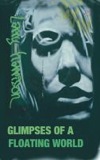 Larry Harrison’s dark and dazzling first novel, Glimpses of a Floating World takes its title from the phrase used to describe the red-light district of 18th century Edo, now known as Tokyo. The Japanese term alludes to the Buddhist concept for “the transient nature and suffering that defines our earthly existence.” Edo’s floating world was a haven of pleasure and illusion, filled with kabuki actors, geishas and courtesans. Harrison’s work is set in London’s Soho, 1963, its denizens — anarchists, mods, rockers, beats, and others, among them our protagonist, seventeen year-old Ronnie “Fizz” Jarvis who loves feeling that he is part of “the scene.”
Larry Harrison’s dark and dazzling first novel, Glimpses of a Floating World takes its title from the phrase used to describe the red-light district of 18th century Edo, now known as Tokyo. The Japanese term alludes to the Buddhist concept for “the transient nature and suffering that defines our earthly existence.” Edo’s floating world was a haven of pleasure and illusion, filled with kabuki actors, geishas and courtesans. Harrison’s work is set in London’s Soho, 1963, its denizens — anarchists, mods, rockers, beats, and others, among them our protagonist, seventeen year-old Ronnie “Fizz” Jarvis who loves feeling that he is part of “the scene.”
The novel opens with two heroin addicts on their way to a fix. The griminess of the dialogue is pitch perfect in its rhythm and authenticity. Ronnie, one of the fortunate few with a prescription for heroin and cocaine is eighteen minutes away from his chemist’s and would gladly die sooner to make up the time.
Our “hero”, the son of an abusive, alcoholic, upwardly mobile Scotland Yard officer, survives by staying in squats and selling small amounts of his excess stock on the black market.
Harrison skillfully makes it easy for the reader to identify with Ronnie despite the character’s being vain, selfish and occasionally cowardly. He is, after all, an adolescent trying to understand the world and his place in it. Ronnie, fiercely intelligent, tells himself that he is not constricted by his addiction but enhanced by it. He is a self-proclaimed rationalist and anarchist, identifying with the beats. Since age twelve, he has “collected extreme experiences in a conscious attempt to destroy childishness.”
Ronnie reminds us of other young, unreliable characters on the precipice of manhood in an imperfect world. The reader is immediately aware that no matter what else happens, Ronnie will either grow and change, or he will not. We root for Ronnie’s potential, hoping he will live to tell the tale.
Harrison’s Soho is not a land of flower children and love beads. There’s still a sense of post-war deprivation. Ruth Ellis has recently been executed. Political scandals involving naughty politicians and call girls are in the news, while on the streets police corruption is endemic and gangsters have celebrity status. Heroin addiction, however, is relatively rare. While addicts like Ronnie scam the system, which allows him to walk away drugs in hand for easy resale, the black market in illegal drugs is small.
Early in our story, Ronnie is caught shooting up in a restroom. While his heroin and cocaine are legal, he has a small amount of opium that isn’t. In jail, he is interviewed by an elderly (at least to his adolescent eyes) prison doctor. When she tells him that he’ll be dead soon if he keeps going, he replies, “We’re all going to die… You’re going to die a lot sooner than I am.”
She believes she’s been threatened, classifies him as a psychopath, and Ronnie is sent to a mental hospital that reminded this reader of a cross between a Dickensian workhouse and a Ken Kesey nightmare. Ronnie overhears the nurses discussing how easy psychosurgery will make their jobs and soon escapes.
Several chapters are told from different points of view. We see both the war and early post-war years through the eyes of Ronnie’s parents. Freddy’s drinking, jealousy and violence eventually drive Flo to leave and return to her hometown of Swindon — a place Ronnie will always deny being from. Freddy has managed to rise to become a senior officer, but his son has been out of his life for years.
While the atmosphere and depth of characterization is strong, so is the pacing and plot development. Ronnie’s initial arrest, psychiatric diagnosis, escapes and recaptures all lead to a situation where he is forced to turn informant even though he knows nothing about any large scale narcotics dealers and does not believe that any exist. The shifting points of view allow the reader to know more than the characters, and the last quarter of the novel is a compulsively addictive page-turner in which Ronnie’s fate is anything but certain.
Harrison who has written nonfiction books on alcohol and drug issues, seamlessly weaves in the growing panic over narcotics. While the world was on the brink of nuclear Armageddon and scandal reigned, Britain — influenced by the US — was changing its policies, moving from treating addiction as a public health issue to criminalizing addicts. Ronnie is as much a victim of these changes as he is of his abusive father and his own self-destructiveness.
Glimpses of a Floating World is described on its back cover as “a lyrical and triumphant elegy to a seedy, vice-ridden London of the 1960’s. ” It is that, but also a tale of familial tragedy, a history lesson, a novel that offers much more than simple glimpses.
Glimpses may not be easy to find in your local bookstore though you can order it online as a paperback or download FOR FREE as an ebook through the link provided. It’s from Year Zero, a writers’ collective dedicated to creating a new relationship between readers and writers without the filter of the publishing industry. Agreed, there are many skeptics who still won’t touch books not given the imprimatur of even a small publishing house. This novel puts lie to the myth that important literature can only be found on store shelves. In addition to reading like a lost classic, it’s polished, proofed and edited. If you’re a serious reader, skeptical about anything that sounds like self-publishing, I urge you to rise to the challenge and sample it online for free. Believe me, it’ll be a more rewarding experience than a trip to Border’s to browse through the latest Jane Austen with zombies tome.
